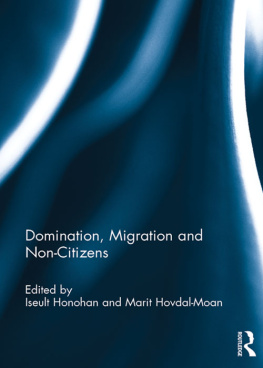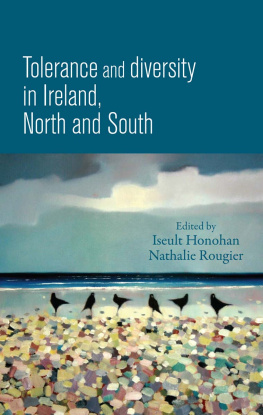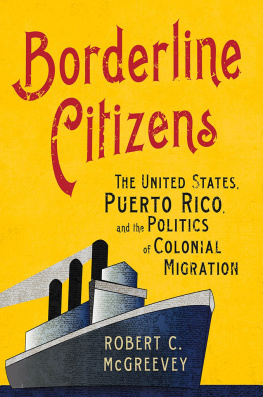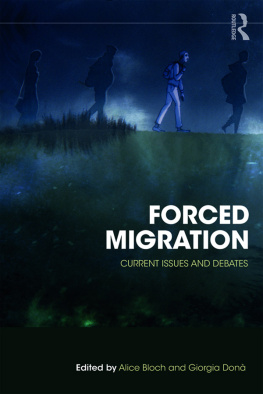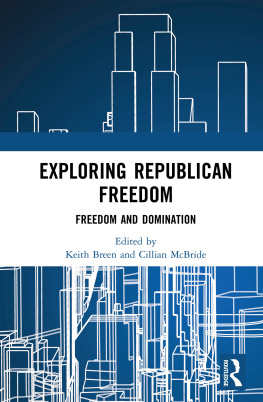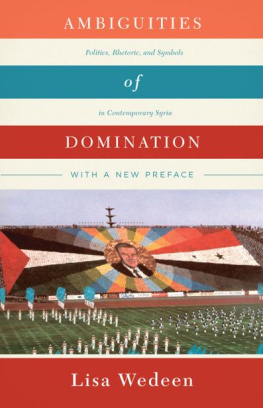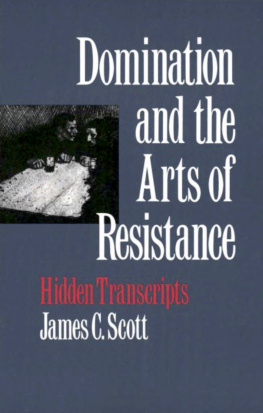Domination, Migration and
Non-Citizens
Does the concept of domination cast new light on issues that arise in the context of migration and citizenship? If citizenship is a status that provides protection from domination, understood as subjection to arbitrary interference, are non-citizens whether outside or inside the state necessarily subject to domination by virtue of being non-citizens? Does domination provide a useful basis for considering the harms that migrants suffer? If non-domination is a value to be promoted in politics, what are the implications for the treatment of migrants and resident non-citizens?
This book addresses issues of migration and citizenship within the frame of freedom, in terms of domination, understood as being subject to the threat of arbitrary interference. Coming from a variety of perspectives, the chapters examine the issues of migration controls, differential resident statuses, including temporary workers, refugees and long-term residents, and the conditions for access to citizenship in the light of these concerns.
This book was published as a special issue of the Critical Review of International Social and Political Philosophy.
Iseult Honohan is Senior Lecturer in the School of Politics and International Relations, University College Dublin, Ireland. Her research interests lie in republican political theory and its applications, especially to the areas of diversity, migration and citizenship, on which she has published Civic republicanism (Routledge, 2002), two edited volumes, and a number of articles.
Marit Hovdal-Moan is a postdoctoral research fellow at the Philosophy Department, Norwegian University of Science and Technology, Norway. Her research focuses primarily on normative approaches to international migration management, and the moral justifiability of state borders and boundaries.
Domination, Migration and
Non-Citizens
Edited by
Iseult Honohan and Marit Hovdal-Moan
First published 2015
by Routledge
2 Park Square, Milton Park, Abingdon, Oxon, OX14 4RN, UK
and by Routledge
711 Third Avenue, New York, NY 10017, USA
Routledge is an imprint of the Taylor & Francis Group, an informa business
2015 Taylor & Francis
All rights reserved. No part of this book may be reprinted or reproduced or utilised in any form or by any electronic, mechanical, or other means, now known or hereafter invented, including photocopying and recording, or in any information storage or retrieval system, without permission in writing from the publishers.
Trademark notice: Product or corporate names may be trademarks or registered trademarks, and are used only for identification and explanation without intent to infringe.
British Library Cataloguing in Publication Data
A catalogue record for this book is available from the British Library
ISBN 13: 978-0-415-74780-6
ePub eISBN 13: 978-1-317-75100-7
Mobipocket/Kindle eISBN 13: 978-1-317-75099-4
Typeset in Times New Roman
by RefineCatch Limited, Bungay, Suffolk
Publishers Note
The publisher accepts responsibility for any inconsistencies that may have arisen during the conversion of this book from journal articles to book chapters, namely the possible inclusion of journal terminology.
Disclaimer
Every effort has been made to contact copyright holders for their permission to reprint material in this book. The publishers would be grateful to hear from any copyright holder who is not here acknowledged and will undertake to rectify any errors or omissions in future editions of this book.
Contents
Iseult Honohan and Marit Hovdal-Moan
Sarah Fine
Iseult Honohan
Meghan Benton
Marit Hovdal-Moan
David Owen
Lubomira Radoilska
Christopher Bertram
The chapters in this book were originally published in the Critical Review of International Social and Political Philosophy, volume 17, issue 1 (January 2014). When citing this material, please use the original page numbering for each article, as follows:
Chapter 1
Introduction: Domination, migration and non-citizens
Iseult Honohan and Marit Hovdal-Moan
Critical Review of International Social and Political Philosophy, volume 17, issue 1 (January 2014) pp. 19
Chapter 2
Non-domination and the ethics of migration
Sarah Fine
Critical Review of International Social and Political Philosophy, volume 17, issue 1 (January 2014) pp. 1030
Chapter 3
Domination and migration: an alternative approach to the legitimacy of migration controls
Iseult Honohan
Critical Review of International Social and Political Philosophy, volume 17, issue 1 (January 2014) pp. 3148
Chapter 4
The problem of denizenship: a non-domination framework
Meghan Benton
Critical Review of International Social and Political Philosophy, volume 17, issue 1 (January 2014) pp. 4969
Chapter 5
Unequal residence statuses and the ideal of non-domination
Marit Hovdal-Moan
Critical Review of International Social and Political Philosophy, volume 17, issue 1 (January 2014) pp. 7089
Chapter 6
Republicanism and the constitution of migrant statuses
David Owen
Critical Review of International Social and Political Philosophy, volume 17, issue 1 (January 2014) pp. 90110
Chapter 7
Immigration, interpersonal trust and national culture
Lubomira Radoilska
Critical Review of International Social and Political Philosophy, volume 17, issue 1 (January 2014) pp. 111128
Chapter 8
Competing methods of territorial control, migration and justice
Christopher Bertram
Critical Review of International Social and Political Philosophy, volume 17, issue 1 (January 2014) pp. 129143
Please direct any queries you may have about the citations to clsuk.permissions@cengage.com
Iseult Honohana and Marit Hovdal-Moanb
aPolitics and International Relations, University College Dublin, Dublin, Ireland;
bPhilosophy, Norwegian University of Science and Technology, Trondheim, Norway
In Europe and other regions of the world public debate concerning how many immigrants should be admitted, which rights those admitted should have, and which conditions can be required for access to citizenship is intense and enduring, and these have increasingly become central electoral issues. On the one hand, the harsh treatment of migrants is often a matter of public criticism; on the other hand, states are concerned about problems of welfare, security and social unrest that they have come to associate with large-scale migration. At its most fundamental level, this debate concerns the question of how best to balance particularist principles of democratic self-determination and state sovereignty and universalist principles of individual freedom and human rights.
The articles in this special issue examine whether the concept of domination can cast a distinctive light on the normative issues arising in this tension between state sovereignty and universal principles with respect to migration and the position of non-citizens in contemporary liberal democratic states. These issues arise both externally insofar as foreigners are subject to migration controls, and internally insofar as migrants live in states of which they are not full members. The issue thus examines the potential of domination as a concept to bring to bear on issues of migration controls, differential residence statuses and access to membership.

